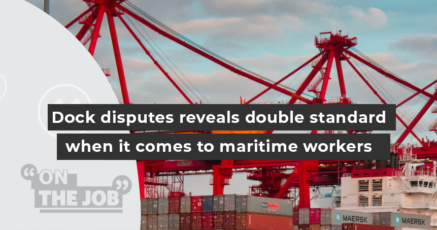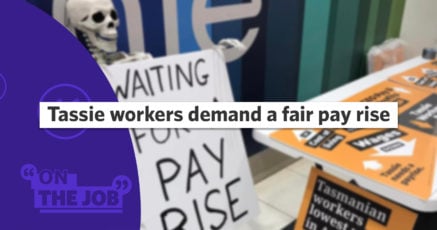When Amazon founder and owner, Jeff Bezos, returned from his recent self-aggrandising space flight, he made a point of thanking Amazon workers and customers for making it possible.
What went unsaid, was that Bezos’ Amazon has built its success off the back of a work culture built of ruthlessness and worker exploitation.
Journalist Alex Press hosts a podcast called Primer which focuses on understanding how Amazon operates. She joined On the Job with Francis Leach and Sally Rugg to give more insight into the life of an Amazon worker, detailing conditions that have led to an astonishing 150 per cent turnover in staff.
“We’re talking about every few months, the entire workforce has effectively been started anew,” explains Press.
“Of course, there are people who stick around for years but there are many people who leave within the first week. So overall, it’s just a constant churn.
“The reasons for that are manifold, but they mostly come down to what the working conditions are at an Amazon warehouse.”
Press says that while some of the more sensational working conditions have dominated headlines, it’s the constant monitoring of time that is taking a toll on workers.
“The real thing that most people are experiencing on the shop floor of a warehouse is definitely this constant obsession over time.
“Amazon calls this time off task, which is anytime a worker spends not picking are sorting objects moving goods from one part of the warehouse to the other. That’s all the time off task, which adds up.
“If you have too much of it, your manager starts yelling at you. If you have even more of that you get terminated, you get fired.
“So that is a big part of it, this feeling that you’re constantly being tracked and surveilled, that also leads people to feel very dehumanized.”
Despite these conditions, Amazon workers in Alabama recently voted no to unionising, something Press says is unsurprising given the anti-union campaigning run by Amazon.
“The company did a very good job in its anti-union campaign, of laying out these lines of division, that you are part of the family of Amazon, and we are going to look out with you if you stick with us.
“Whereas the union, they would say, the union is a business, they’re extracting dues from you, and they’re just out for profit.
“I wish I was joking, but this is what was said in what are called captive audience meetings where the management speaks to workers about why they shouldn’t unionize.
“This is one of the most profitable companies in the world, that is very much extracting profits from its workforce…and yet, they’re getting up in front of workers and saying that we are your family, not the union.”
“Amazon spent millions of dollars having the best-paid consultants from law firms come in and direct their management on the warehouse floor, over how to scare workers into voting no and that was very effective.
“Workers were basically convinced that the warehouse would shut down if they unionize, they were convinced that they would be personally retaliated against. Some workers felt that they were being surveilled, that the boss would know how they voted, and then retaliate against them for that it doesn’t have to be true for a worker to think it’s true.”
While the unionisation battle was lost in Alabama, Press holds hope that the war for workers’ rights can still be won.
“This was sort of the first shot across the bow, right.
“I think a lot of workers across warehouses, and a lot of people in unions are sort of metabolizing the lessons learned and moving forward.”
Listen to the full interview with Alex Press and make your working life better by subscribing to the new podcast On the Job with Francis Leach & Sally Rugg.








SHARE:
The billionaire space race and the exploited workers left behind